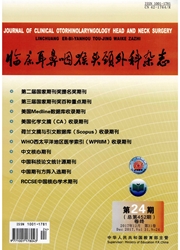

 中文摘要:
中文摘要:
目的:分析外耳道罕见恶性肿瘤患者相关的诊疗方法及预后情况。方法:去除常见的外耳道鳞状细胞癌和腺样囊性癌患者,共收集8例外耳道罕见恶性肿瘤患者,回顾性分析其临床表现、分期、手术方法、辅助治疗措施及预后。结果:共有基底细胞癌5例,黏液表皮样癌2例,肌上皮癌1例。基底细胞癌患者中有3例患者被长期误诊,4例T1期患者仅通过完整切除肿物即达到良好预后,1例T2期患者行单纯切除术后2年出现肿瘤复发和转移,辅以放疗,现肿瘤得以控制;黏液表皮样癌患者均被误诊为外耳道良性肿瘤而行切除手术,术后病理诊断为黏液表皮样癌,1例鼻咽部及咽旁间隙转移,给予同步放化疗,随访5年,肿瘤控制佳,另1例腮腺受侵,行肿瘤扩大切除,术后随访1年,未见复发;1例T4期腮腺肌上皮癌转移至外耳道患者行颞骨部分切除术,术后1年未见肿瘤复发。结论:外耳道罕见恶性肿瘤因发病率极低,发病位置隐蔽,常被误诊。因此在诊疗过程中,应注意减少误诊的发生率。早期肿瘤以手术彻底切除为主,晚期可考虑辅以放化疗。
 英文摘要:
英文摘要:
Objective:To analyze the diagnosis, therapy and prognosis of the rare cases of malignant tumors in external auditory canal. Method:Eight cases of rare malignant tumors in external auditory canal were collected ex- cept squamous cell carcinoma and adenoid cystic carcinoma. The clinical manifestation, staging, surgical method, secondary treatment and prognosis were analysed. Result:There were 5 cases of basal cell carcinoma and 2 cases of mucoepidermoid carcinoma and 1 case of myoepithelial carcinoma. Three cases of the 5 basal cell carcinoma in external auditory canal have been misdiagnosed for a long time. After admission, 4 of the 5 basal cell carcinoma were T1 stage and cured only by a complete resection of tumor. One case of T2 stage basal cell carcinoma was found recurrence 2 years later after the first excision of tumor, and was treated with radiotherapy. Tumor was controlled.Two cases of mucoepidermoid carcinoma had been misdiagnosed as a benign tumor and received a resection. One case was found metastasis to the parapbaryngeal space and nasopharynx and was treated with concurrent chemo- therapy. Tumor was also controlled after 5-years follow-up. Another case was found metastasis to parotid gland and received an expanding tumor resection. No recurrence was detected after a 1-year followed up. One case of T4 stage myoepithelial carcinoma in external auditory canal was a metastasis of parotid and received a partial temporal bone resection. No recurrence was found 1 year later. Conclusion: Because the tumors above have a very low incidence in external ear canal and the location of tumors are hidden, they are often misdiagnosed and delayed in treatment. Therefore, otologists should pay more attention to avoid the misdiagnosis. To the treatment, complete surgical resection of early-stage tumor is important and for late-stage tumor, a supplemented by chemoradiotherapy may be needed.
 同期刊论文项目
同期刊论文项目
 同项目期刊论文
同项目期刊论文
 期刊信息
期刊信息
